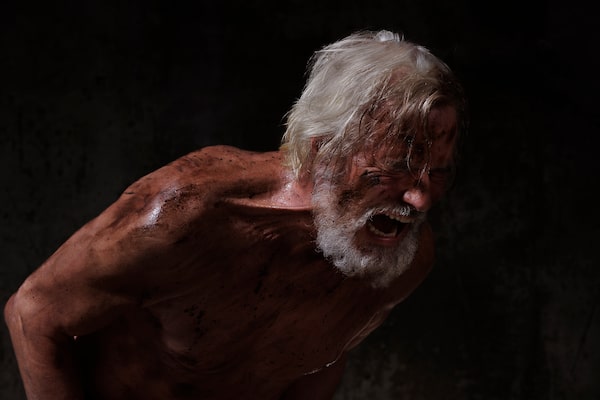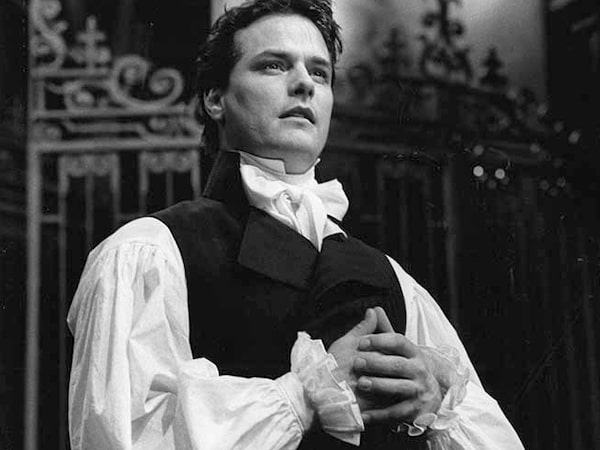Actor Paul Gross is playing the titular role of King Lear in this season's Stratford Festival Theatre in Stratford, Ont., on May 8.Carlos Osorio/The Globe and Mail
Paul Gross, at 64, is not too young to be playing King Lear.
Why, then, is that the first reflexive reaction from so many people upon learning that the Canadian actor is playing the part at the Stratford Festival this season? Is it because they still picture him at the height of his fame – as the eccentric, do-goodin’ Chicago-stationed RCMP Constable Benton Fraser on TV’s Due South in the 1990s, or as the star in one of his made-in-Canada films such as Men With Brooms and Passchendaele in the 2000s?
Even a former theatre critic initially questioned the casting before recognizing that William Hutt had played the part at Stratford at age 52, and that Colm Feore was a fresh-faced 55 when he did his turn as the self-described “very foolish fond old man, fourscore and upward.” (Kenneth Branagh, 62, is the big Lear this coming season in London and New York.)
All the bewilderment or consternation, I suspect, ultimately has less to do with Gross’s actual age and more to do with what past profilers have called his “sex appeal.”
Even with a long mane of white hair and a matching beard that blasts halfway down his chest like a bib, the actor remains – as Lear’s director, Kimberley Rampersad, puts it – “incredibly attractive,” which for her opens up exciting possibilities in how audiences might relate to Lear, and is a way to break through their preconceived notions about the play.

Gross as King Lear.David Hou/Stratford Festival
A Twitter follower put it this way, perhaps a little too bluntly: Gross is a LILF. (Yes, like MILF, but the L stands for Lear.)
Gross lets out a laugh and a puff of smoke when I share, somewhat sheepishly, that acronym with him near the end of a walk-and-talk interview along the Avon River in Stratford, Ont. He’s having a cigarette on a picnic bench, the pointy circular shape of the Festival Theatre looming up the incline behind him looking like a giant crown on his head.
“It’s an honour,” he says. “LILF – that’s such a niche market.”
At the same time, however, the conversation around his casting brings up memories for him of his turn as Hamlet at Stratford in 2000 – which, it’s hard to believe, given his significant place in the discourse about the place this century, is the only other time he’s acted at the destination repertory theatre.
That was when his peculiar Canadian celebrity was at its pinnacle, and his multifaceted career was pancaked down into “pretty face” in coverage of what ended up becoming the most-seen Shakespeare production in the festival’s history at that time.
“Yeah, it feels sort of like a similar thing, in a way, with Hamlet: ‘Oh he’s too pretty to be Hamlet,’ or ‘He’s a television guy,’” Gross says. He shrugs.
Gross was, indeed, identified primarily as a “TV heartthrob” even in positive reviews. In the scattered pans, his beauty was sometimes weaponized against him. (”Handsome attempt; Celebrity good looks not enough to carry this dry, uninteresting Hamlet,” was one headline.)
In those days, when phrases such as “boob tube” and “idiot box” still had currency, his casting as Hamlet was held up as a prime example of the supposed overcommercialization of Stratford under then-artistic director Richard Monette, whose seasons at the turn of the century attracted what are still record audiences.
Gross’s ample past experience on the stage (including winning a Dora Mavor Moore Award for a role in Toronto) or off (his first job at Stratford was as playwright-in-residence in 1986) was brushed aside, his work in film and television deemed irrelevant.
It’s all the rage to reassess the media narratives surrounding American pop-culture icons at the turn of the millennium. Is Paul Gross a Canadian celeb of that period whose treatment at the time might be worth re-examining too?
A quarter-century on from when he was reportedly the highest-paid Canadian TV star in history – and more than a decade on from his impressive run as a rare bankable homegrown star in English-language Canadian movies that he also wrote, and sometimes directed and produced – Gross can keep a relatively low profile.
He’s generally left unperturbed by passersby as he walks around Stratford, often with his dogs, a pair of rescues named Charlie (“mostly Jack Russell”) and Banjo (“some kind of terrier mix”), in tow, working on Lear in his head.
Gross in a scene from a 1998 episode of his Due South comedy-action series.The Canadian Press
(Even without his canine companions, Gross walks as if he still had them both on a leash, coming to a complete stop at strange, unexpected moments, as if his interviewer might want to try out a fire hydrant.)
The dedicated theatre crowd coming to see King Lear may actually be most likely to identify Gross these days with his starring role in Slings & Arrows, the enduring cult TV series inspired by Stratford and the tension between commerce and art. The show originally aired on The Movie Network 20 years ago this year, and it finds new fans – including The Wire creator David Simon – each time it ends up on a new streaming service. (It’s currently available in Canada on CBC Gem, though the public broadcaster originally turned the show down.)
Monette was decidedly not part of that fanbase, Gross recalls, and he does a fine impression of the late director’s voice declaring, “It’s vile!”
How strange, in retrospect, that Gross went from being the poster child for the supposed excesses of Monette’s tenure as artistic director to the star of a fictional show that critiqued it (but was mainly a love letter to Stratford) in just three years.
It’s somewhat ironic, too, given the Hamlet hullabaloo, that Gross’s small-screen portrayal of eccentric, accidental artistic director Geoffrey Tennant on Slings & Arrows lead to a burst of respectable stage work in the United States as the old bias against the small screen evaporated at the start of the prestige TV era.
Slings & Arrows helped pave the way for Gross’s Broadway debut in 2011. Former National Theatre of Great Britain artistic director Richard Eyre was a devotee, and cast him alongside Kim Cattrall in a production of Noel Coward’s Private Lives.
The actor remains in contact with Eyre and has been peppering him with e-mailed questions such as, “Why doesn’t Lear recognize Kent?”
Eyre’s legendary Shakespeare productions include a 1989 Hamlet that starred, and nearly broke, Daniel Day-Lewis – an incident that inspired the backstory of Gross’s sometimes mentally unstable actor-turned-director character on Sling & Arrows.
Things didn’t go quite so off-the-rails for Gross when he played the Dane at Stratford in 2000, but it was nevertheless a nerve-wracking experience. “I did think I was losing my mind at one point, because I would have these blackouts,” he recalls. “I was unconsciously doing scenes – I couldn’t remember them. Or I’d wake up on stage and not know what scene I was in.”
Paul Gross stars in Passchendaele.Chris Large/Handout
Helpful in guiding him through the process was Brent Carver, the late Tony Award-winning actor who had played Hamlet twice before and was starring as Tevye in Fiddler on the Roof that same season. Carver assured Gross that the paranoia he was feeling was natural. “I’d say, ‘I don’t trust anyone in the cast.’ And he’d say, ‘Yes, that’s good.’”
Gross describes Hamlet as a character who begins in a deep state of grief and is slowly ground down psychologically both by Shakespeare’s cruel plot and his own constant self-examination.
Playing Lear, by contrast, is a walk in the park. “Lear is not really introspective, so he starts the play feeling quite good,” Gross says. “He’s got a pretty good plan for succession. It should work. Then it doesn’t. It’s [his daughters’] fault; I hate them; they’re ungrateful; now I’m bonkers; and now I’m dead.”
Gross says the part is exhausting but – he borrows this comparison from Tom McCamus, who just played the role at Toronto’s Soulpepper Theatre – like a long, hard day of skiing: You end it spent but feeling good.
While Gross’s public history at Stratford is short but spicy, his personal relationship with the institution is longer.
Born in Calgary, Gross’s family travelled around a lot because of his father’s career in the military. During a stint in Toronto, his mother brought her teenage son to see Hutt in King Lear. That first 1972 visit to Stratford captivated Gross to the point that when the head of a prop spear broke during an on-stage fight, he raced down the aisle to grab it – an early, perhaps subconscious, sign of how eagerly he wanted to be part of the theatre.
Years later, after studying theatre at the University of Alberta, Gross auditioned to play Romeo in the festival’s 1984 season, but Colm Feore won the part.
Gross played that role the next year, instead, in Toronto’s High Park. (Per The Globe and Mail theatre critic Ray Conlogue, he was “so good-looking that some women sitting near to me on opening night would forcibly argue that the only thing he could do wrong would be to go home alone afterward.”)

Gross as Hamlet at the 2000 Stratford Festival.Cylla von Tiedemann/Stratford Festival
Instead of becoming a Stratford star, Gross toiled as a playwright and stage actor elsewhere before ultimately shifting to more lucrative film and TV work. But he observed the goings-on in the small city with the big theatre as boyfriend and later husband of Martha Burns, who performed at Stratford off and on in the 1980s and 1990s before helping to found the alternative classics company Soulpepper in 1998. “She has a much more tortured relationship to the place than I do,” Gross says.
In the final season of Slings & Arrows, Hutt played an actor playing King Lear – and Gross got to really know the man who’d inspired him as a teen. “I felt that that was quite full circle,” he recalls. “And he kept talking to me about, when would I do it?”
That time is now, and there are many things Gross is enjoying about his return to the Stratford stage two decades on – beyond the fact that he’s not worried about really going mad this time. “When I did Hamlet, there was a style here – the verse was all that mattered, in a way,” he says. “It was good, but it was a little tired, somehow. Whatever had been propelling it for a while seemed to have run out of steam.”
By contrast, Gross – who calls Shakespeare’s verse a “great ally” but sees it as a heartbeat to feel rather than something rigid to follow – is energized by the current, far more diverse company. “The eagerness, the keenness, it is like night and day,” he says.
Rampersad echoes that the actors in her cast are not averse to verse and indeed find much to love in it, but that she, too, feels there are other ways to say Shakespeare’s language. “If we break a verse, then we buy it,” she says.
The director describes Gross as a good partner in the rehearsal room in terms of sharing leadership, and she notes that, in contrast with some other senior artists she’s observed, he has a more reciprocal relationship with the younger generation.
Of course, to many in that age group, Gross is not a celebrity at all. The actor playing Lear’s daughter Cordelia, Tara Sky, confesses: “I didn’t actually know who he was before meeting him.”
Indeed, Sky was most excited to learn that the “goof” they were working and sharing laughs with in rehearsal was the husband of Burns, a teacher who inspired them when they were at the National Theatre School of Canada.
It’s Lear’s idea, at the start of Shakespeare’s play, to pass power down to the next generation in his kingdom, but trouble starts when he also wants to keep wielding the power he’s given away.
Gross, on the other hand, is sanguine, even encouraging, about power shifts in his industry. “At first, when all of the upheaval began, it was really disorienting,” the white actor and writer says of the move in TV and film toward being representative behind the scenes as well as in front of the camera. “Friends of mine, producers or actors or writers, would call. You know, ‘We’re not going to get any work.’”
His argument to them was: “Well, we’ve had complete run of the field for as long as we’ve been working.”
Some of Gross’s long-time fans may have trouble with the fact he is now Lear-aged – perhaps because it means recognizing they are headed toward the heath of no return as well. But the actor is okay with being older: A decade ago he let his hair go white – after dying it for TV roles since his 20s – while on a family trip to the Sahara Desert.
Objectification was never a part of his career that Gross enjoyed, though he believes returning to Canada from Hollywood, which he hated, to star in Due South in the 1990s saved him from the worst effects of celebrity.
“I look at people like Brad Pitt and I think, God, what an ... awful life,” he says. “You can’t go anywhere. We could not have this conversation.”




 J. Kelly Nestruck
J. Kelly Nestruck